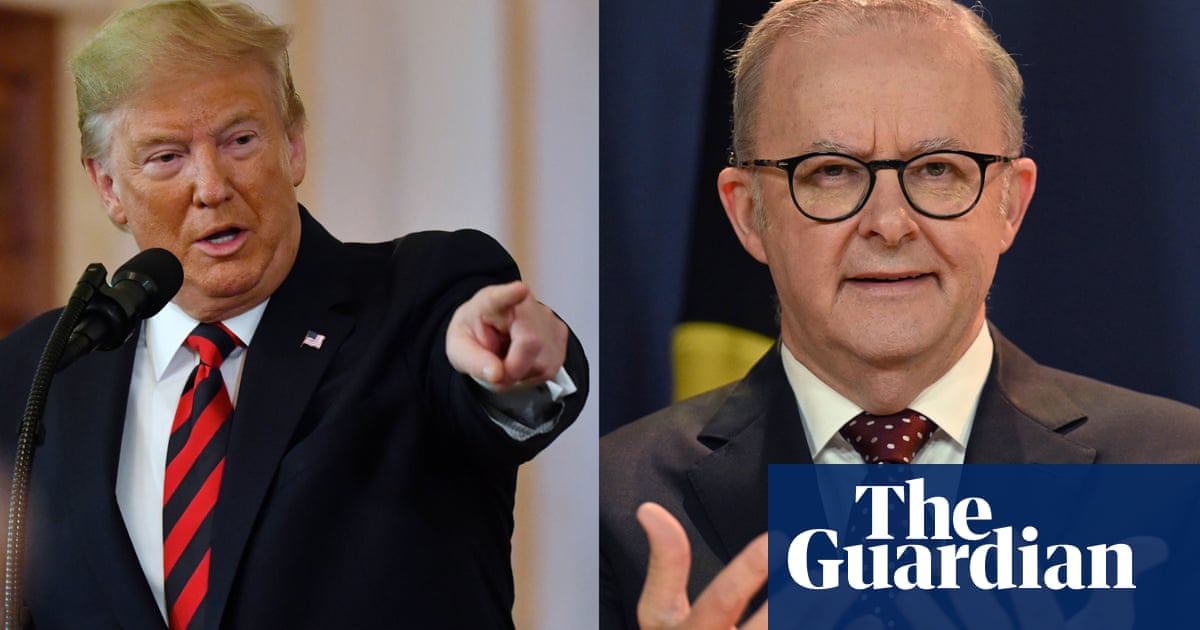Donald Trump says he will speak to the Australian prime minister about trade, telling reporters he knows the Australian government has been trying to contact him.
Australia goes to a federal election on Saturday and while the incumbent,Anthony Albanese, is favoured to win, Trump could be dealing with an alternative prime minister after the weekend.
Taking questions as he left the White House for a rally marking 100 days back in office, Trump was asked by Australian reporters from Nine newspapers and television: “The Australian prime minister is having an election this weekend. Will you speak to him about trade?”
Sign up for the Afternoon Update: Election 2025 email newsletter
Trump replied: “They are calling and I will be talking to him, yes.”
There was no indication when the conversation would take place.
The Australian government has been seeking to negotiate with the Trump administration over America’s controversial tariffs regime, whichincludes a minimum 10% tariff on almost all imports from Australiaand 25% tariffs on specific items, including steel and aluminium.
Trump’s tariff regime has been an election issue in Australia, though not a pre-eminent one, and Albanese has fielded criticism during the campaign for not making personal contact with the president to argue for exemptions.
The opposition argued that Australia’s position as a security ally that consistently runs a trade deficit with the US should have helped Albanese secure special consideration, as Australia did in Trump’s first term.
Albanese was under pressure for failing to secure a call with Trump to negotiate, and during an election debate the prime minister said hewas not even sure if the president has a mobile phone.
But, in the initial tariff announcement, Australia did secure the lowest tariff rate – 10% – imposed on all countries without a higher rate.
Albanese has consistently described Trump’s tariff regime as “an act of economic self-harm” and damaging to the US relationship with Australia.
“The administration’s tariffs have no basis in logic and they go against the basis of our two nations’ partnership. This is not the act of a friend,” he said when they were imposed.
The Australian treasurer, Jim Chalmers, told ABC radio on Wednesday morning the government had been “engaging” at all levels with the US administration.
Sign up toAfternoon Update: Election 2025
Our Australian afternoon update breaks down the key election campaign stories of the day, telling you what’s happening and why it matters
after newsletter promotion
“That engagement has been ongoing,” he said. “Prime Minister Albanese has already had a couple of conversations with President Trump in recent months. We flagged an interest in more discussions and I think what President Trump said today just reflects that.
“We’re speaking up for and standing up for our national economic interest.”
Most of the US tariff regime has been put on pause. A 90-day reprieve on the imposition of tariffs above the 10% baseline is due to expire in July.
China, the main target of the tariff regime, is the exception: 125% tariffs on Chinese goods, with carve-outs for Chinese-made smartphones, computers and semiconductors, are in place. They are in addition to a 20% tariff related to the US fentanyl crisis.
China has responded with 125% tariffs on US-made goods.
The US commerce secretary, Howard Lutnick, told business network CNBC on Tuesday, US time, that a compromise on tariffs had been struck with one country – a parliamentary democracy – though he would not say which one.
“I have a deal done,” Lutnick said. “But I need to wait for their prime minister and their parliament to give its approval, which I expect shortly.”
